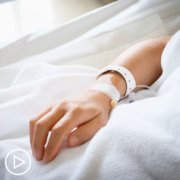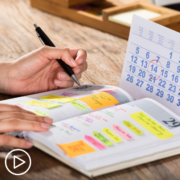A Patient’s Perspective | Participating in a Clinical Trial
A Patient’s Perspective | Participating in a Clinical Trial from Patient Empowerment Network on Vimeo.
Colorectal cancer survivor Cindi Terwoord recounts her clinical trial experience and explains why she believes patients should consider trial participation.
Dr. Pauline Funchain is a medical oncologist at the Cleveland Clinic. Dr. Funchain serves as Director of the Melanoma Oncology Program, co-Director of the Comprehensive Melanoma Program, and is also Director of the Genomics Program at the Taussig Cancer Institute of the Cleveland Clinic. Learn more about Dr. Funchain, here.
Cindi Terwoord is a colorectal cancer survivor and patient advocate. Learn more about Cindi, here.
See More from Clinical Trials 101
Related Resources:

|

|

|
Transcript:
Katherine Banwell:
Cindi, you were diagnosed with stage IV colorectal cancer, and decided to participate in a clinic trial. Can you tell us about what it was like when you were diagnosed?
Cindi Terwoord:
Yeah. That was in September of 2019, and I had had some problems; bloody diarrhea one evening, and then the next morning the same thing. So, I called my husband at work, I said, “Things aren’t looking right. I think I’d better go to the emergency room.”
And so, we went there, they took blood work – so I think they knew something was going on – and said, “We’re going to keep you for observation.” So, then I knew it must’ve been something bad. And so, two days later, then I had a colonoscopy, and that’s when they found the tumor, and so that was the beginning of my journey.
Katherine Banwell:
Mm-hmm. Had you had a colonoscopy before, or was that your first one?
Cindi Terwoord:
No, I had screenings, I would get screenings. I had heard a lot of bad things about colonoscopies, and complications and that, so I was always very leery of doing that. Shame on me. I go for my other screenings, but I didn’t like to do that one. I have those down pat now, I’m very good at those.
Katherine Banwell:
Yeah, I’m sure you do. So, Cindi, what helped guide your decision to join a clinical trial?
Cindi Terwoord:
Well, I have a friend – it was very interesting.
He was probably one of the first people we told, because he had all sorts of cancer, and he was, I believe, one of the first patients in the nation to take part in this trial. It’s nivolumab (Opdivo), and he’s been on it for about seven years. And he had had various cancers would crop up, but it was keeping him alive.
And so, frankly, I didn’t know I was going to have the option of a trial, but he told me run straight to Cleveland Clinic, it’s one of the best hospitals. So, I took his advice. And the first day the doctor walked in, and then all these people walked in, and I’m like, “Why do I have so many people in here?” Not just a doctor and a nurse. There was like a whole – this is interesting.
And so, then they said, “Well, we have something to offer you. And we have this immunotherapy trial, and you would be one of the first patients to try this.”
Now, when they said first patient, I’m not quite sure if they meant the first colon cancer patient, I’m not sure. But they told me the name of it, and I said, “I’m in. I’m in.” Because I knew my friend had survived all these years, and I thought, “Well, I’ve gotten the worst diagnosis I can have, what do I have to lose?” So, I said, “I’m on board, I’m on board.”
Katherine Banwell:
Mm-hmm. Did you have any hesitations?
Cindi Terwoord:
Nope. No, I’m an optimistic person, and what they assured me was that I could drop out at any time, which I liked that option.
Because I go, “Well, if I’m not feeling well, and it’s not working, I’ll get out.” So, I liked that part of it. I also liked, as Dr. Funchain had said, you go in for more visits. And I like being closely monitored, I felt that was very good.
I’ve always kept very good track of my health. I get my records, I get my office notes from my doctor. I’m one of those people. I probably know the results of blood tests before the doctor does because I’m looking them up. So, I felt very confident in their care. They watched me like a hawk. I kept a diary because they were asking me so many questions.
Katherine Banwell:
Oh, good for you.
Cindi Terwoord:
I’m a transcriptionist, so I just typed out all my notes, and I’d hand it to them.
Katherine Banwell:
That’s a great idea.
Cindi Terwoord:
Here’s how I’m feeling, here’s…And I was very lucky I didn’t have many side effects.
Katherine Banwell:
In your conversations with your doctor, did you weigh the pros and cons about joining a trial? Or had you already made up your mind that yes, indeed, you were going for it?
Cindi Terwoord:
Yeah, I already said, “I’m in, I’m in.” Like I said, it had kept my friend alive for these many years, he’s still on it, and I had no hesitation whatsoever.
I wish more people – I wanted to get out there and talk to every patient in the waiting room and say, “Do it, do it.”
I mean, you can’t start chemotherapy then get in the trial. And if I ever hear of someone that has cancer, I ask them, “Well, were you given the option to get into a trial?” Well, and then some of them had started the chemo before they even thought of that.
Katherine Banwell:
Mm-hmm. So, how are you doing now, Cindi? How are you feeling?
Cindi Terwoord:
Good, good, I’m doing fantastic, thank goodness, and staying healthy. I’m big into herbal supplements, always was, so I keep those up, and I’m exercising. I’m pretty much back to normal –
Katherine Banwell:
Cindi, what advice do you have for patients who may be considering participating in a trial?
Cindi Terwoord:
Do it. Like I said, I don’t see any downside to it. You want to get better as quickly as possible, and this could help accelerate your recovery. And everything Dr. Funchain mentioned, as far as – I really never brought up any questions about whether it would be covered.
And then somewhere along the line, one of the research people said, “Well, anything the trial research group needs done – like the blood draws – that’s not charged to your insurance.” So, that was nice, that was very encouraging, because I think everybody’s afraid your insurance is going to drop you or something.
And then the first day I was in there for treatment, a social worker came in, and they talked to you. “Do you need financial help? We also have art therapy, music therapy,” so that was very helpful. I mean, she came in and said, “I’m a social worker,” and I’m like, “Oh, okay. I didn’t know somebody was coming in here to talk to me.”
But that was all very helpful, and I did get free parking for a few weeks. I mean, sometimes I’d have to remind them. I’d say, “It’s costing me more to park than to get treated.” But, yeah, like I said, I’m a big advocate for it, because you hear so many positive outcomes from immunotherapy trials, and boy, I’d say if you’re a candidate, do it.
Katherine Banwell:
Dr. Funchain, do you have any final thoughts that you’d like to leave the audience with?
Dr. Pauline Funchain:
First, Cindi, I have to say thank you. I say thank you to every clinical trial participant, everybody who participates in the science. Because honestly, whether you give blood, or you try a new drug, I think people don’t understand how many other lives they touch when they do that.
It’s really incredible. Coming into clinic day in and day out, we get to see – I mean, really, even within a year or two years, there are people that we’ve seen on clinical trial that we’re now treating normally, standardly, insurance is paying for it, it’s all standard of care. And those are even the people we can see, and there are so many people we can’t see in other centers all over the world, and people who will go on after us, right?
So, it’s an amazing – I wouldn’t even consider most of the time that it’s a personal sacrifice. There are a couple more visits and things like that, but it is an incredible gift that people do, in terms of getting trials. And then for some of those trials, people have some amazing results.
And so, just the opportunity to have patients get an outcome that wouldn’t have existed without that trial, like Cindi, is incredible, incredible.




